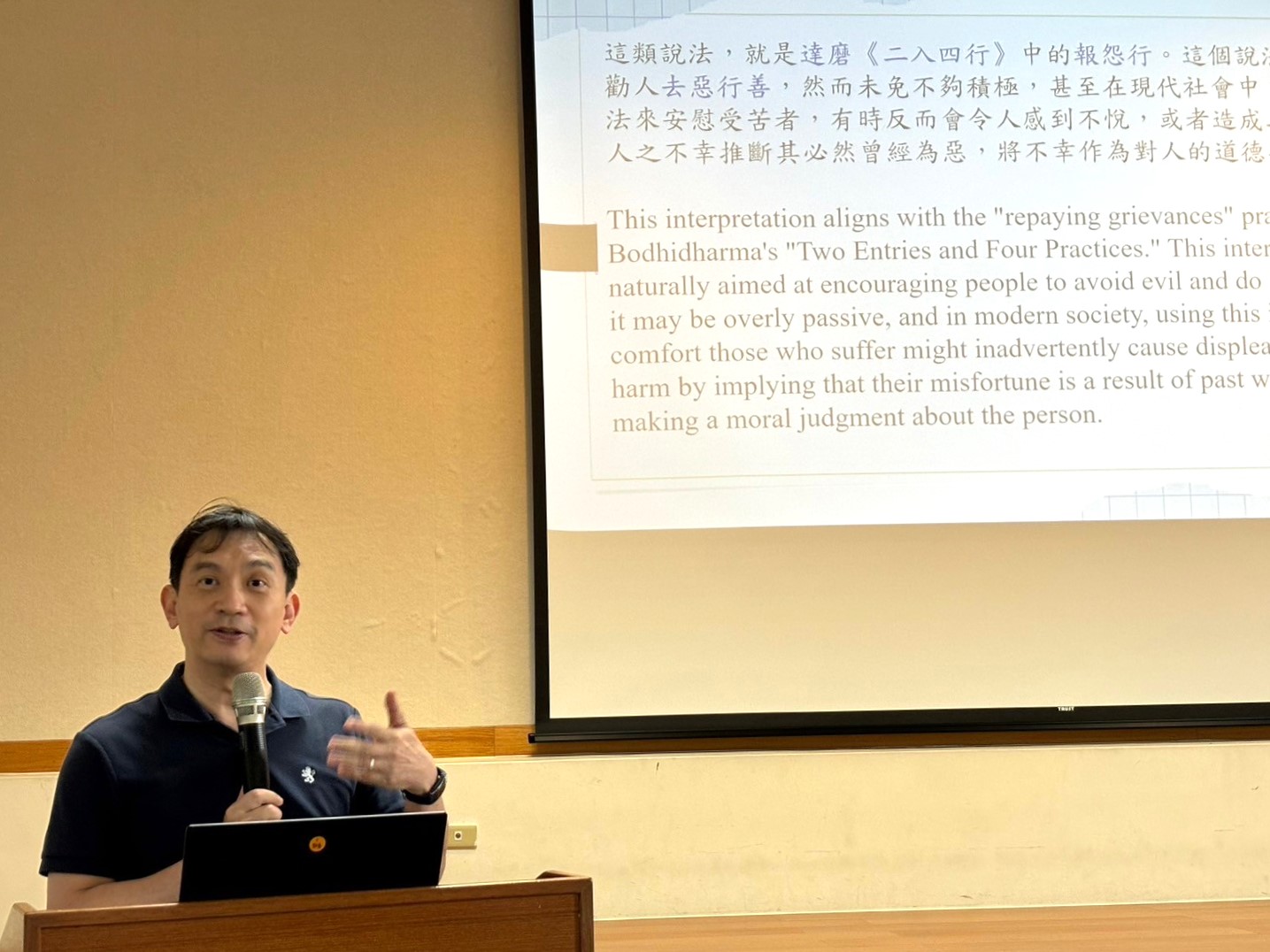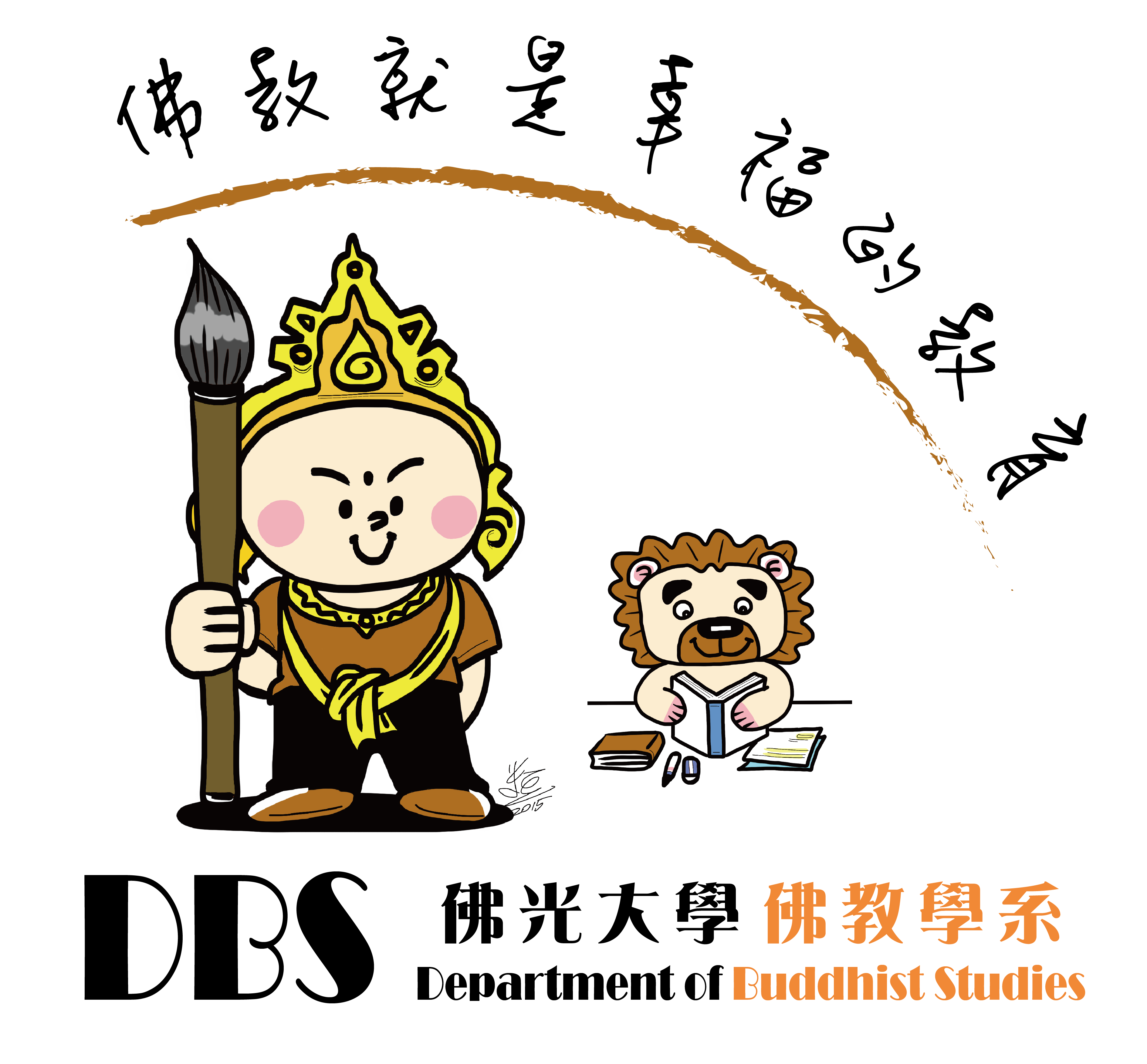文 / 郭朝顺院长
Repaying Debts or Returning Favors
Dean’s 112-2 End-of-Semester Address to the Entire College
最近在常在课堂或在学术会议中提到一个说法,业种可以被理解为一种文化概念,因为就唯识学而言,业种的是为名言熏习所成,名言就是我们赖以理解并表达一切对象的语言文化,它是构成众生阿赖耶识的基本形式。将业种理解为文化概念,可以包含将业视为「债」,或者视为「恩」的两类说法。现在就对这两种说法稍微谈谈。
Recently, I have often mentioned in classes or at academic conferences that karma seeds can be understood as a cultural concept. According to Yogācāra, karma seeds are formed through the conditioning of language and culture, which is how we understand and express all objects. This language culture forms the basic structure of the ālayavijñāna (store consciousness) of sentient beings. Understanding karma seeds as a cultural concept can encompass two interpretations: viewing karma as a "debt" or as a "favor." Let me discuss these two interpretations briefly.
将业视为债的说法,常常出现在强调因果报应的善书中。这类善书往往会强调:今生所受之苦即是偿还过去所造诸恶业,而今生所造诸恶业,便得由来世偿还。所以若生了不肖子女,父母便会说是来讨债的;碰到不幸的事情,就会自我安慰地想,这是业报。这类说法,就是达磨《二入四行》中的报怨行。这个说法自然是为了劝人去恶行善,然而未免不够积极,甚至在现代社会中,若用这个说法来安慰受苦者,有时反而会令人感到不悦,或者造成二度伤害:由人之不幸推断其必然曾经为恶,将不幸作为对人的道德判断。
The notion of viewing karma as a debt often appears in Chinese folk texts known as ‘precious scrolls’ that emphasize cause and effect retribution. Precious scrolls tend to stress that the suffering we endure in this life is the repayment of the evil deeds we committed in the past, and the evil deeds we commit in this life will be repaid in future lives. Therefore, if one has unfilial children, parents might say they are here to collect debts; when encountering misfortune, one might console oneself by thinking it is karmic retribution. This interpretation aligns with the "repaying grievances" practice in Bodhidharma's "Two Entries and Four Practices." This interpretation is naturally aimed at encouraging people to avoid evil and do good. However, it may be overly passive, and in modern society, using this interpretation to comfort those who suffer might inadvertently cause displeasure or secondary harm by implying that their misfortune is a result of past wrongdoing, thus making a moral judgment about the person.
如果从报恩的角度来解读的话,人生在世有幸与不幸之事,幸福之时固然勿忘受之于人的恩德,然而由幸转为不幸之时,更勿忘记原本所曾受的恩德之可贵,更不要只是怨恨此时之不幸,反而要努力创造令自己及旁人幸福之条件。一切的幸与不幸皆是诸因缘所成。若有人从一生下来,从没有嚐过幸福的滋味,则我们更应怜悯他,令之经历到可以润泽其生命之幸福甘露,这便是在回报我们曾受之于人的恩德。
If we interpret it from the perspective of returning favors, in the fortunes and misfortunes of life, we should not forget the kindness we have received from others during times of happiness. However, when fortune turns to misfortune, we should remember the preciousness of the kindness we once received and not merely resent the current misfortune. Instead, we should strive to create conditions for happiness for ourselves and others. All fortunes and misfortunes arise from various conditions. If someone has never experienced happiness since birth, we should feel even more compassion for them and strive to bring them the nectar of happiness that can enrich their lives. This is how we repay the kindness we have received from others.
以报恩而非偿债的观点,来解读业报时,我们将更能体会,何以星云大师在世界各地的道场建立滴水坊,因为:「滴水之恩湧泉以报」。报恩不是偿债。若是偿债会有债主、债权,因此还债须还给特定债主;若是报恩,则是将所受恩德回报天地万物及每一众生。还债的业报观,只教人忍受,报恩的业报观,则是如大师倡导三好四给,创造人间的良善业报循环,以令净土在人间实现。
By interpreting karmic retribution from the perspective of returning favors rather than repaying debts, we can better understand why Venerable Master Hsing Yun established the Dripping Water cafes in his temples worldwide, because "a drop of water shall be returned with a burst of spring." Returning favors is not the same as repaying debts. Repaying debts involves a creditor and a debtor, requiring the debt to be repaid to a specific creditor. Returning favors, on the other hand, involves repaying the kindness received to all beings and everything in the universe. The karmic view of repaying debts only teaches endurance, while the karmic view of returning favors, as advocated by the Venerable Master through the Three Acts of Goodness and the Four Givings, creates a virtuous cycle of karmic retribution, bringing the Pure Land to the human world.


 佛光大学 佛教学院/佛教学系
佛光大学 佛教学院/佛教学系



















